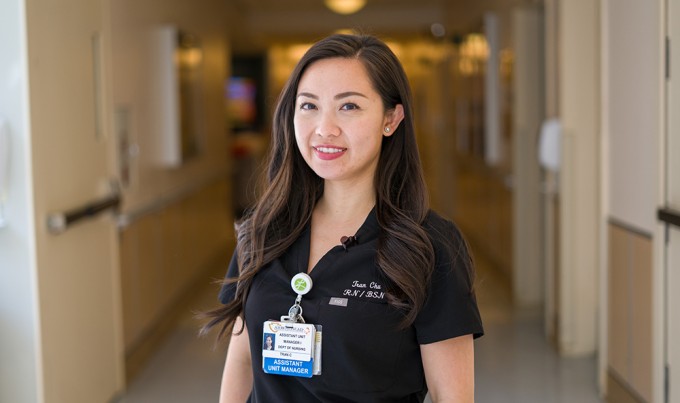My Specialty
Correctional Nursing, Tran Chu, Arrowhead Regional Medical Center
Safely providing care and advocacy for county jail inmates

Tran Chu, RN, BSN
Assistant Unit Manager I / Charge Nurse
Med-Surg/Telemetry/Correctional Floor
Arrowhead Regional Medical Center, Colton
Please share the story of your nursing career.
Growing up, I envisioned myself working in the medical field. When I was in high school, I volunteered to work in the nursing office as a nurse’s aide as my elective course in both my sophomore and senior years. I was intrigued by how passionate and caring the nurses were towards all the students and staff at the school.
While attending Cal State San Bernardino, I volunteered in the nursery and postpartum unit at Arrowhead Regional Medical Center (ARMC). Although my first bachelor’s degree was in social sciences, I decided to continue my education in the fields of nursing and healthcare.
On my 24th birthday, I received a life-changing phone call from the admissions office at Northeastern University in Boston, congratulating me on my acceptance into their nursing program. I ventured to Boston alone, not knowing anyone in the big city, but I made amazing friends among my fellow nursing students and got to work in the most prestigious hospitals in the heart of Boston.
After earning my second bachelor’s degree, I moved back to California and took a position at Grace Medical Group as an authorization coordinator. I then transitioned into acute care here at ARMC.
How did you come to work in corrections?
I say that corrections chose me instead of my volunteering for it. I believe it takes a special kind of heart to become a nurse in this type of setting.
Is your unit solely for county jail inmates, or does it also serve the general population?
Arrowhead Regional Medical Center (ARMC) serves the general population, but the hospital’s 5-North unit is the designated unit to take care of inmate patients from county jails. We mainly work with West Valley Detention Center, but we also provide care for patients from state and federal facilities, ICE, juvenile hall and Patton State.
San Bernardino County sheriff’s deputies are stationed on 5-North, and there is a separate jail ward with private rooms for inmate patients. Most of these patients are still undergoing or awaiting trial for their cases and have not been convicted or sentenced. We also admit some patients who are brought in by police. These patients are known as “absentee bookings” because they are still awaiting booking into the jail system.












